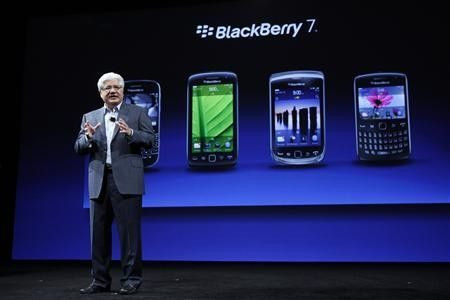RIM Aims to Rebuild Franchise on New BBX Platform

Research In Motion will introduce souped-up operating software for its BlackBerry smartphone and PlayBook tablet, aiming to make them more formidable competitors to Apple and Google devices.
At a developers conference in San Francisco, the Canadian company said on Tuesday it would install its new BBX platform in next-generation devices but provided no timetable.
BBX would replace the antiquated software that now powers the BlackBerry with a package built around the QNX system, already the engine behind the PlayBook. RIM wants to reverse a growing preference for faster and more intuitive Apple devices and those powered by Google's Android.
RIM is also eager to make more apps available for the tablet. To that end, RIM said it was giving developers a tool to adapt their Android programs for the Playbook, which has sold poorly since its April debut.
Developers had a muted initial reaction to the announcements, and many were hoping RIM would open the conference by taking the wraps off splashy new hardware.
BBX could potentially be exciting, but I was honestly expecting a bigger announcement. There was nothing revolutionary, said Dave Lane, a software developer for Metova, a small firm based in Tennessee.
But RIM did not say when the BBX software would show up in a product, and was silent on when the PlayBook might handle email routed through its secure enterprise servers without being linked to a BlackBerry. Critics say that is a big shortcoming of RIM's tablet.
CCS Insight analyst John Jackson said RIM's vagueness about its new line of BBX-equipped smartphones may have amounted to another misstep for a company that's acquiring a reputation for them.
In the absence of specifics about the next-generation phones, there's the risk that the market will lose patience and RIM will lose an opportunity to remind the world why it's still relevant, he said.
Investors appeared neither disappointed nor very excited. RIM shares rose 3.6 percent to $23.21 in Nasdaq trade on Tuesday, but the stock has fallen about 60 percent since the beginning of the year.
The San Francisco conference is the first public stage for the Canadian company since last week's global disruption of BlackBerry service. The outage highlighted a series of setbacks for RIM over the past year as the company struggled to regain its stride after falling behind in a market it once dominated.
On Monday the company said it would give away premium apps worth at least $100 as partial compensation for the service disruption.
NEW TOOLS
RIM is desperate to win over developers who are more eager to create games and other apps for Apple's iPhone and iPad and for the slew of devices using Android.
We need to get out there and recruit developers to target our platform, Alec Saunders, RIM's vice-president for developer relations, said on the sidelines of the conference.
RIM said the BBX platform would not support the Java coding language that underwrites its legacy BlackBerry devices.
Still, Saunders highlighted the PlayBook's ability to use open Web standards and promised that any app built for the PlayBook today would still work on the future BBX platform.
Attracting new developers is going to be a must for RIM to stay relevant in a rapidly growing app ecosystem where developers are getting more options every day, said Kunal Gupta, chief executive of Polar Mobile, an app developer in Toronto.
Even so, developers may prefer to wait until BBX-equipped hardware hits the market to gauge demand before making a commitment to create apps. On the other hand, consumers may not embrace any new hardware unless a rich array of apps is available to run on the devices.
The biggest mystery with RIM is when are we going to see this on devices that people can actually buy, said Scott Michaels, a vice-president at Atimi Software, which develops mobile phone applications for major brands including the National Hockey League.
We are not going to expend effort in a big way for a Fortune 1000 company until you at least sell a million units that are live in the market, with this technology on it.
© Copyright Thomson Reuters 2024. All rights reserved.





















